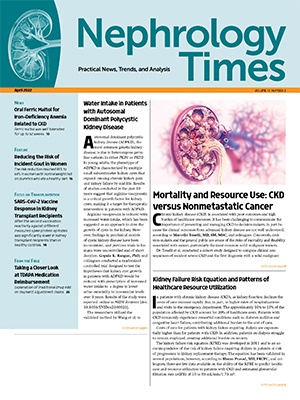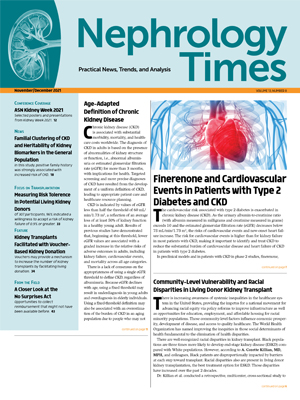
Patients with gout experience considerable negative effects on health and quality of life. There are known associations between hyperuricemia and gout and declining renal function. Results of recent studies have suggested that renal dysfunction and kidney transplant are risk factors for gout.
Nimish Mehta, PhD, MBA, and colleagues at Medscape LLC, New York, New York, recently conducted a study to determine whether online, segmented education could be used to improve knowledge, competence, and confidence among nephrologists regarding management of gout in patients with chronic kidney disease (CKD) and among recipients of kidney transplant. Results of the study were reported during a virtual poster session at ASN Kidney Week 2021 in a poster titled Improving the Management of Gout in Patients with CKD or Kidney Transplant: Effect of Online Education.
The educational design included a 45-minute video activity with slides, segmented into a series of five mini-lectures from different faculty. The lectures covered various aspects of gout in patients with or without CKD or kidney transplant. The effectiveness of the activity was assessed using repeated-pairs pre-/post-assessment study design with three questions related to knowledge and one related to confidence. Participants served as their own controls. Statical significance at the P<.05 level was assessed using a chi-squared test. The online activity launched on September 25, 2020; data were collected through December 4, 2020.
The analysis set included responses from 89 nephrologists who answered all of the assessment questions during the study period. Analysis of responses pre- and post-intervention revealed a significant improvement in overall knowledge: average correct responses increased from 52% pre-intervention to 76% post-intervention.
Specific areas of improvement included: (1) treat-to target strategy, with a target of serum uric acid level <6 mg/dL in patients treated with urate lowering therapy (20% relative improvement, P<.05); (2) starting low-dose allopurinol in a patient previously diagnosed with gout and stage 3 CKD presenting with painful subcutaneous tophi (25% relative improvement, P<.01); (3) recommending pegloticase without dose adjustment for the management of refractory gout in patients with stage 4 or 5 CKD (222% relative improvement, P<.001).
Following the intervention, 48% of the participants had a measurable increase in confidence in their ability to manage patients with CKD who develop gout.
In conclusion, the researchers said, “This study demonstrated the success of online, segmented mini-lectures on improving the evidence-based knowledge, competence, and confidence of nephrologists in appropriately managing gout in patients with CKD or kidney transplant.”
Funding for the analysis was provided by Horizon Therapeutics
Source: Mehta N, Maeglin J, Badal K. Improving the management of gout in patients with CKD or kidney transplant: Effect of online education. Abstract of a poster presented at the American Society of Nephrology virtual Kidney Week 2021 (Abstract PO1064), November 2021.





 © 2025 Mashup Media, LLC, a Formedics Property. All Rights Reserved.
© 2025 Mashup Media, LLC, a Formedics Property. All Rights Reserved.